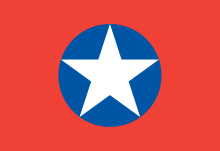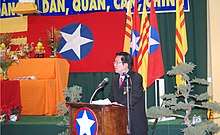Nationalist Party of Greater Vietnam
The Nationalist Party of Greater Vietnam (in Vietnamese: Đại Việt Quốc dân đảng), often known simply as Đại Việt or DVQDD, was a nationalist and anti-communist political party and militant organisation that was active in Vietnam in the 20th century. The party continues to be active outside of Vietnam, with the goal of a multi-party democratic government for the country.
Nationalist Party of Greater Vietnam Đại Việt Quốc dân đảng | |
|---|---|
| Chairman | Trần Trọng Đạt |
| Founder | Trương Tử Anh |
| Founded | 10 December 1939 |
| Ideology | Vietnamese nationalism Anti-communism |
| Colors | Red, Blue, White |
| Party flag | |
 | |
| Website | |
| daivietquocdandang.net | |
History
The party was founded by Trương Tử Anh,[1] known as "Anh Cả Phương" ("Eldest Brother Phương"). Among the original members were several prominent figures in Vietnam's politics, such as Dr. Phan Huy Quát and Dr. Nguyễn Tôn Hoàn.[2]
During the era of French colonialism, the Đại Việt engaged in military attacks in an effort to gain independence. Some Đại Việt members were trained in Chinese military academies in Yunnan run by the Kuomintang, before the Communist revolution in China. The party was pro-Japanese during World War II, when the Japanese occupied Indochina. After the partition of Vietnam in 1954, the Đại Việt were banned in the communist North Vietnam. They continued to be active in South Vietnam as an opposition to President Ngô Đình Diệm, and were often implicated in coup plots against Diệm, led by Đại Việt officers in the Army of the Republic of Vietnam.
Notable members included:
- Phan Huy Quát served in different capacities with several government cabinets of the State of Vietnam and of the Republic of Vietnam. His highest position was Prime Minister in 1965.
- Nguyễn Tôn Hoàn briefly served as first Deputy Prime Minister in 1964.
- Hà Thúc Ký[3] was Minister of Internal Affairs in 1964; in 1965, after a rift with other Đại Việt's leaders, he formed his own party, the Đại Việt Cách Mạng (Đại Việt Revolutionary Party).
- Nguyễn Ngọc Huy,[4] the party's theorist and founder of the Tân Đại Việt (New Đại Việt Party); taught at Yale University after the fall of Saigon.
- Bùi Diễm was Ambassador to the US in the early 1970s.
- Dương Hiếu Nghĩa, who participated in the 1963 coup d'état, was one of the officers who deposed and assassinated President Ngô Đình Diệm and National Adviser Ngô Đình Nhu on 2 November 1963.

See also
References
- , Official website of the Overseas DVQDD Party (in Vietnamese)
- Nguyễn Tôn Hoàn, former South Vietnam deputy premier, p. 84
- Official website of the DVCM Party (in Vietnamese)
- Profile of Nguyễn Ngọc Huy